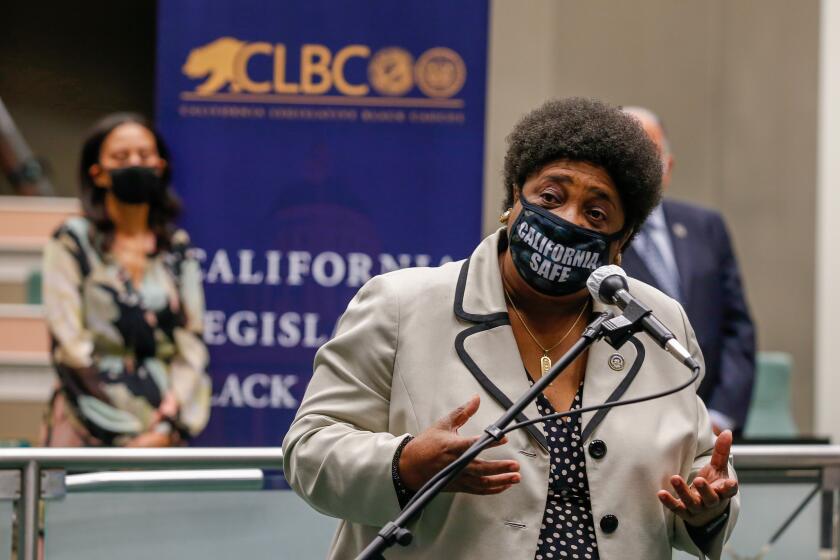California’s reparations effort moves ahead: Here’s what’s next

- Share via
SACRAMENTO — California’s Reparations Task Force voted Tuesday to define those who are eligible for reparations as descendants of African Americans enslaved in the U.S. or of free Black people living in the country before the end of the 19th century.
Much of the discussion among the task force members focused on differing interpretations of the state law that created the panel and on whether all Black Californians should receive some form of reparation because of the lasting effects of slavery and the discrimination that has continued long after abolition. After hours of tense debate, the group voted to tie reparations to lineage.
California’s Reparations Task Force is preparing to answer the pivotal question of who should receive reparations for slavery.
“This measure is about reparations for those who are harmed by chattel slavery in this country,” said the Rev. Amos Brown, a civil rights leader and vice chair of the task force.
The government-appointed panel took action to define who should be able to receive reparations almost 10 months into a two-year process to develop a proposal for addressing slavery and discrimination.
After hearing from nearly a dozen experts in genealogy and other aspects of the reparations movement, the panel voted 5-4 in support of the lineage-based approach. The vote marks a major milestone for the task force, but many other difficult questions lie ahead.
Who is eligible for reparations?
The motion that narrowly passed defines “the community of eligibility based on lineage determined by an individual being an African American descendant of a chattel enslaved person or the descendant of a free black person living in the United States prior to the end of the 19th century.”
Why did the task force choose to limit eligibility in this way?
Gov. Gavin Newsom and legislative leaders appointed the task force — which comprises elected officials, civil rights leaders, attorneys and reparations experts — with a mission “to study and develop reparation proposals for African Americans, with a special consideration for African Americans who are descendants of persons enslaved in the United States.” Secretary of State Shirley Weber, who authored the law that Newsom signed in 2020 to launch the effort, emphasized in January that providing reparations is “an issue of descendancy and lineage.”
A slim majority of the task force interpreted that language and Weber’s statements to mean that reparations should be lineage-based and go strictly to those who can trace their ancestry to the era of slavery. But the decision was not unanimous.
The state law also directs the task force to consider the lingering negative effects of the institution of slavery and discrimination on living African Americans and on society in California and the United States. Several members argued that provision meant reparations should also be offered to all Black Californians, a population the task force estimates to include 2.6 million people.
What bar must be met to prove eligibility?
The task force has not adopted any rules yet for how someone would prove lineage in order to qualify for reparations.
Several genealogy experts raised concerns that some descendants might not be able to prove their ancestral connections because the names of African Americans who were enslaved changed, some records don’t exist or were destroyed or details changed in stories passed down from one generation to the next.
Genealogist Kellie Farrish told the task force that proving lineage to any African American who lived in the United States prior to 1900 could suffice because so few were allowed into the country voluntarily from Africa or the Caribbean before that period.
“Therefore, tracing an ancestor back to the early 1900s living anywhere in the country would prove descent from American chattel slavery since the only Africans that were here were the ones brought involuntarily, if unable to identify an enslaved ancestor by name,” she said.
What reparations will eligible African Americans receive?
That’s still undecided. The task force is not expected to produce a detailed proposal outlining specific recommendations for reparations until July 2023. Then the California Legislature must pass those recommendations in a new law approved by the governor to take effect.
What’s next?
The task force meets again Wednesday at 9 a.m. to hear expert testimony on the “criminal justice system and anti-Black bias.” Some of that testimony will appear in the task force’s first report, which is expected to publish June 1 and include findings to help establish the existence of state-sanctioned racism rooted in slavery from before and after emancipation to the present day.
More to Read
Sign up for Essential California
The most important California stories and recommendations in your inbox every morning.
You may occasionally receive promotional content from the Los Angeles Times.












